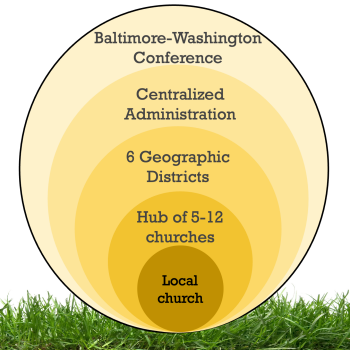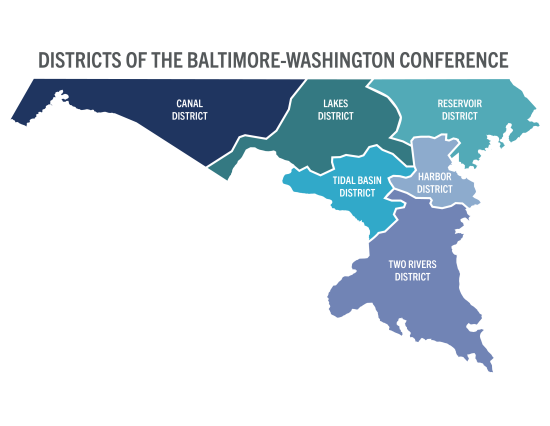Creating Vital Change

The Baltimore-Washington Conference now has a new structure composed of hubs, Connecting Churches, and six new districts. The new structure is accompanied by a renewed call to mission, ministry and our baptismal covenant. This sacred realignment is not merely administrative; it is a movement of the Spirit, a response to the living waters that continue to flow through our hearts, our churches, and our communities. It is vital change.
Bishop LaTrelle Easterling offers details and thanks to all those who worked to make this new structure and this new day possible and calls on the “saints of the Baltimore-Washington Conference, who have been claimed in the waters of baptism, to continue to live out your calling with courage and compassion.”
A number of resources are available to help you navigate this new structure. Church and Hub information on the pages and in the PDFs linked below is updated every two weeks, as needed.
- Message from Bishop Easterling on the new structure
- Church Directory with church names, hub, district, district superintendent
Download PDF - Hub Directory with names of churches within each hub and the Connecting Church - The names of the hubs are placeholder names and it is anticipated that the hubs will name themselves as they begin to meet.
Download PDF - Map of new districts
- Church & hub list by District PDF
Our Vision and Values Are Essential
The goal of this change is vitality – that 100% of our faith communities become 100% focused on deepening discipleship, seeing and valuing all the people, living and loving like Jesus, and multiplying missional impact under the guidance of the Holy Spirit.
Vitality is strongly related to living our shared values voiced by Methodists across the area.
- Love in Action: Practicing God’s love and grace, we build real, transformative relationships in our communities. Ours is not ministry “from a distance,” but ministry “up close and personal”— we are the hands and feet of Christ in the world, serving those in need.
- Strength through Connection: Rooted in the United Methodist tradition of connection, we are united, uplifting one another and holding each other accountable with love. We build strong bonds with one another and across our global church to do as much good as we can, because we truly are better together.
- Unity with Diversity: As God’s beloved community, we each bring our unique stories and strengths to all that we do, united in purpose and committed to equity, inclusion, anti-racism/anti-oppression, and justice for all.
- Partnering with Purpose: Intentional and strategic partnerships with other churches, people, and organizations enable us to share and cross-pollinate ideas, resources, and energy so that we can thrive, bear more fruit, and live according to God’s call.
- Freedom to Try: We prioritize empowering leaders and members to dream big, try new things, and learn from failure. We give permission for creativity and boldness and are committed to staying open to new ways of sharing God’s love with all people.
Restructuring that Supports Robust Incarnational Ministry and Our Values
 The planned changes to the organizational structure beginning July 1, 2025 include:
The planned changes to the organizational structure beginning July 1, 2025 include:
- Collaborative Hubs. Groups of 5-12 congregations will create a shared vision and work together to achieve that vision. Using their shared values and striving for vitality these congregations will work together to build relationships with people inside and outside their culture and faith traditions and work together on missions among the most vulnerable, using their God-given gifts, talents and passions. This change is designed to encourage and support all our values.
Each Hub will be led by a Connecting Church, which the Conference will name. The specifics of each Hub’s work will develop over time and will focus on vitality as they deepen ministry and multiply their impact. - Moving from eight districts to six for missional effectiveness. Hubs will gathered into geographic districts. This change is designed to support unity with diversity, partnering with purpose, and building strength through connection.
- Administrative regions. Non-mission-related, specialized administrative duties will be centralized to support churches, rather than requiring each district to provide these services. This reduces redundancy of expertise across districts and ensures all congregations have access to the best (most efficient and effective) support.
How can you participate?
The Vital Change process starts now, as we all move together through a series of reflect-assess-take action cycles. Church leaders will be provided resources to facilitate collaborative work,discussions, and action. Each cycle will involve two-way feedback as we learn, grow, and change together.
There are several keys to our success as we work on Vital Change. We need you to:
1.) Pray for this vital change to draw United Methodists of the Baltimore-Washington and Peninsula-Delaware Area closer to God’s vision for the church, our neighbors, and one another.
2.) Bring an open mind and a willing heart as you engage in this Vital Change process.
3.) Share information with as many people as possible – Vital Change is for anyone who could possibly be moved by the Vital Change message. This may require innovation and experimentation as we shift our thinking from inviting selected individuals to offering everyone in the congregation and the community the opportunity to engage.
- If you are a leader: reflect on how you can best contribute to the success of Vital Change and share your plan of action with your accountability partners, share this message with everyone you interact with, this is one of the top three priorities for the next three years, and ask for help or guidance if you have questions
- If you are a church or community member: reflect on how you can best contribute to the success of Vital Change and volunteer to help your church or community, and ask for help or guidance if you have questions
Each of us plays a vital role in this sacred journey. Because this is a unique model for connectional discipleship, conscientious care is being taken to craft each step in this vital change process. Time and intentional strategic considerations are essential parts of the work that is before us all.
The conference is committed to transparency, values the input of all people, and will share information with local church leaders as it becomes available. If you have any questions, concerns, or hopes, we encourage you to contact .

